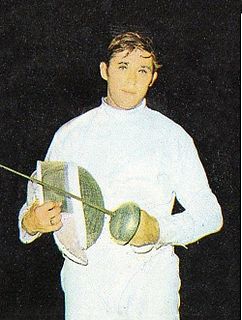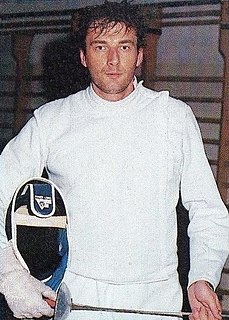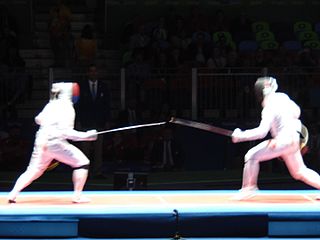
Pavel Anatolyevich Kolobkov is a retired Russian épée fencer. He won one gold, two silver and three bronze medals at five Olympic Games from 1988 to 2004. He served as the Minister of Sport in the Russian government from 2016 to 2020. He also previously served as the Deputy Minister of Sport as well as Deputy Minister of Sport, Tourism and Youth Policy.

Edoardo Mangiarotti was an Italian fencer. He won a total of 39 Olympic titles and World championships, more than any other fencer in the history of the sport. His Olympic medals include one individual gold, five team golds, five silver, and two bronze medals from 1936 to 1960.
The men's team épée was one of four fencing events on the Fencing at the 1908 Summer Olympics programme. The event was won by the French team, who also swept the medals in the individual épée event. Each nation could enter a team of up to 8 fencers, with 4 fencers chosen for each match.

The men's épée was one of eight fencing events on the fencing at the 1964 Summer Olympics programme. It was the fourteenth appearance of the event. The competition was held from October 18 to 19 1964. 65 fencers from 25 nations competed. Each nation was limited to three fencers. The event was won by Grigory Kriss of the Soviet Union, the nation's first gold medal in the event after a bronze four years earlier. The Soviets also took bronze, with Guram Kostava finishing in third place. Between the two was silver medalist Bill Hoskyns of Great Britain; it was the second consecutive Games with a British silver medalist in the event. Italy's six-Games gold medal streak in the men's individual épée ended with the nation missing the podium entirely; Gianluigi Saccaro finished fourth after losing the bronze-medal barrage to Kostava.

Soren Hunter Miles Sussman Thompson is an American épée fencer, team world champion, and two-time Olympian. He represented the United States in the 2004 Olympics in Athens, where he reached the quarterfinals and came in 7th, the best US result in the event since 1956 and at the time the second-best US result of all-time. He also represented the US in the 2012 Olympics in London. Thompson won a gold medal and world championship in the team épée event at the 2012 World Fencing Championships. He was inducted into the USA Fencing Hall of Fame in 2018, and the Southern California Jewish Sports Hall of Fame in 2020.

The men's épée was a competition in fencing at the 2004 Summer Olympics in Athens. A total of 37 men from 21 nations competed in this event. Each nation was limited to 3 fencers. Competition took place in the Fencing Hall at the Helliniko Olympic Complex on August 17. The event was won by Marcel Fischer of Switzerland, the nation's first victory in the event and first medal of any color since 1952. Wang Lei's silver was China's first medal in the men's individual épée. Defending champion Pavel Kolobkov earned bronze, finishing a set of three different-colored Olympic medals in the event. Kolobkov was the fourth man to earn three medals in the event and had the best record of any of the four; only Ramón Fonst had more individual Olympic success in the men's épée. It was the fifth consecutive Games in which a Russian fencer reached the podium, including medals for Russian fencers competing for the Soviet Union (1988) and Unified Team (1992).

The men's sabre was a competition in fencing at the 2004 Summer Olympics in Athens. A total of 39 men from 21 nations competed in this event. Nations had been limited to three fencers each since 1928. Competition took place in the Fencing Hall at the Helliniko Olympic Complex on August 14. The event was won by Aldo Montano of Italy, the nation's first victory in the men's sabre since 1920. Montano accomplished what his grandfather and father, both world champions in the individual event and Olympic medalists in the team competition, had not been able to: Olympic gold in the individual event. Zsolt Nemcsik of Hungary took silver while Vladislav Tretiak earned Ukraine's first medal in the event with his bronze. France's five-Games medal streak ended.

The men's épée fencing competition at the 2008 Summer Olympics in Beijing took place on August 10 at the Olympic Green Convention Centre. There were 41 competitors from 23 nations. The event was won by Matteo Tagliariol of Italy, the nation's first victory in the event since 1960 and first medal of any color since 1968. It was Italy's seventh overall victory, most among nations. The silver medal went to Fabrice Jeannet of France. José Luis Abajo earned Spain's first men's individual épée medal with his bronze. The Russian fencers' streak of five Games on the podium ended.

The men's épée was one of seven fencing events on the Fencing at the 1928 Summer Olympics programme. It was the seventh appearance of the event. The competition was held from 6 August 1928 to 7 August 1928. 59 fencers from 22 nations competed. Each nation could have up to three fencers. The event was won by Lucien Gaudin of France, the nation's third victory in the individual men's épée—taking sole possession of most among nations above Cuba and Belgium, each at two. Gaudin was the second man to win both the foil and épée events at a single Games. It was the third consecutive Games at which France reached the podium in the event. Two Frenchman had reached the head-to-head final; Gaudin won over Georges Buchard, who received silver. Bronze in 1928 went to American George Calnan, the nation's first medal in the event.

The men's épée was one of seven fencing events on the fencing at the 1956 Summer Olympics programme. It was the twelfth appearance of the event. The competition was held on 30 November 1956. 41 fencers from 18 nations competed. Nations were limited to three fencers each. The event was won by Carlo Pavesi of Italy, the nation's fifth consecutive victory in the men's épée. In all five of those Games, Italy earned at least two medals in the event; this was the second sweep during that period for Italy. Giuseppe Delfino was the silver medalist while Edoardo Mangiarotti took bronze. It was Mangiarotti's third medal in the event, along with gold in 1952 and another bronze in 1948; he was the first man to win three medals in the individual épée.

The men's épée was one of eight fencing events on the fencing at the 1968 Summer Olympics programme. It was the fifteenth appearance of the event. The competition was held from 21 to 22 October 1968. 72 fencers from 28 nations competed. Each nation was limited to three fencers. The event was won by Győző Kulcsár of Hungary, the nation's first medal in the men's individual épée. Defending gold medalist Grigory Kriss of the Soviet Union took silver, becoming the eighth man to win multiple medals in the event and extending the Soviet podium streak to three Games. Italy returned to the podium as well after a one-Games absence broke its six-Games gold medal streak, with Gianluigi Saccaro earning bronze.

The men's épée was one of eight fencing events on the fencing at the 1988 Summer Olympics programme. It was the twentieth appearance of the event. The competition was held from 23 to 24 September 1988. 79 fencers from 33 nations competed. Each nation was limited to 3 fencers. The event was won by Arnd Schmitt of West Germany, the nation's second victory in the event. France's Philippe Riboud took silver, adding to his 1980 and 1984 bronze medals to become the third man to earn three medals in the individual épée. Andrey Shuvalov earned the Soviet Union's first medal in the event since 1968 with his bronze.

The men's sabre was one of eight fencing events on the fencing at the 1988 Summer Olympics programme. It was the twenty-first appearance of the event. The competition was held from 22 to 23 September 1988. 40 fencers from 18 nations competed. Nations had been limited to three fencers each since 1928. The event was won by defending champion Jean-François Lamour of France, the fourth man to successfully defend an Olympic title in the sabre and the 11th man overall to win multiple medals in the event. It was France's third victory in the event, matching the Soviet Union for second-most all-time. Janusz Olech took silver, Poland's first medal in the event since 1968. Italian Giovanni Scalzo earned bronze.

The men's épée was one of eight fencing events on the fencing at the 1992 Summer Olympics programme. It was the twenty-first appearance of the event. The competition was held on 1 August 1992. 70 fencers from 30 nations competed. Each nation was limited to three fencers. The event was won by Éric Srecki of France, the nation's fifth victory in the event. France also took bronze, with Jean-Michel Henry winning the bronze medal match. France's podium streak in the event extended to four Games. Pavel Kolobkov of the Unified Team took silver.

The men's épée was one of ten fencing events on the fencing at the 1996 Summer Olympics programme. It was the twenty-second appearance of the event. The competition was held on 20 July 1996. 45 fencers from 21 nations competed, a sharply reduced number from prior Games which generally had 60 to 80 fencers. Each nation remained limited to 3 fencers in the event. The event was won by Aleksandr Beketov of Russia, the nation's first victory and first medal in the event in its debut. Iván Trevejo's silver was Cuba's first medal in the event since Ramón Fonst won the first two gold medals in 1900 and 1904. The bronze went to Géza Imre of Hungary, that nation's first medal in the men's individual épée since 1980. France's four-Games podium streak ended.

The men's foil was one of ten fencing events on the fencing at the 1996 Summer Olympics programme. It was the twenty-second appearance of the event. The competition was held on 22 July 1996. 45 fencers from 19 nations competed. Nations had been limited to three fencers each since 1928. The event was won by Alessandro Puccini of Italy, the nation's eighth victory in the men's foil. France took the other two medals, with Lionel Plumenail earning silver and Franck Boidin winning the bronze medal match.

The men's sabre was one of ten fencing events on the fencing at the 2000 Summer Olympics programme. It was the twenty-fourth appearance of the event. The competition was held on 21 September 2000. 39 fencers from 20 nations competed. Nations had been limited to three fencers each since 1928. The event was won by Mihai Covaliu of Romania, the nation's first medal in the men's sabre. Mathieu Gourdain's silver extended France's podium streak in the event to five Games. Germany also earned its first medal in the men's sabre, with Wiradech Kothny's bronze.

The men's épée competition in fencing at the 2016 Summer Olympics in Rio de Janeiro was held on 9 August at the Carioca Arena 3. There were 38 competitors from 20 nations. South Korea's Park Sang-young won the individual gold, the first victory for South Korea in the event after bronze medals in 2000 and 2012. Géza Imre took silver, Hungary's first medal in the event since 1996. Imre, at age 41, was the oldest individual fencing medalist since 1952. Gauthier Grumier of France earned bronze.

The men's team épée event at the 2020 Summer Olympics took place on 30 July 2021 at the Makuhari Messe. 27 fencers from 9 nations competed. The competition was won by Japan, with Russian Olympic athletes taking silver and South Korea bronze. The previous medal of Russia in men's team épée was in 1996; Japan and South Korea never medaled in this event. The 2016 champions and silver medalist, Italy and France, did not make it to the semifinals, the bronze medalist, Hungary, did not quality for the Olympics.


















